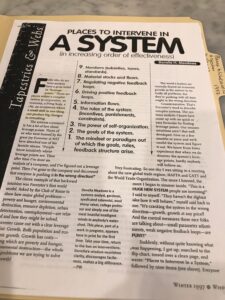“I can only take one apocalypse at a time.” That’s what the bank teller said to me during a recent trip to the bank when his computer couldn’t manage a simple deposit. As we stood there waiting for this machine to do its work, he alluded, probably only half jokingly, to the possibilities of artificial intelligence screwing with us.
“That’s what it’s come to when we have to multitask apocalypses,” was my reply. And that too, especially now, seems more true than mere idle humor and public small talk. We both enjoyed that moment of levity though and then I was on my way.
Maybe the teller’s attitude was one of bewilderment, but maybe it was acceptance and transcendence. I don’t know if he was a fatalist or a bank teller buddha, but I’m banking on the latter and have for a long time wondered what transcendence is. Surely it’s a nice ideal, at least if we believe the status quo is going badly for the things that matter to us most. But how would we recognize the seeds of transcendence and how might we change big systems of power?
An email this morning from our friend and inspiration, Sister Mary at the Center at Donaldson (here, here and here for example), embodies a mindset that underlies the answer:
On the eve of the Coronavirus, I do believe we are on the edge of a new consciousness, a “great turning” as Joanna Macy calls it, and Jim Wallis, too [1].

Twenty-some years ago I came across an amazing little magazine article by the late, great Donella Meadows, thanks to a friend. Places to Intervene in a System is a ranking of “leverage points” for changing a system, and it’s a classic, with changing mindsets as the most powerful place to intervene. I always thought, yea that’s right, great, but never really contemplated how that actually happened. Why? Policies, numbers, rules, politics and so forth are more familiar to us and our organizations.
For AIRE, it’s about modeling the system we want, as opposed to fighting the system we want to change. We can design what we want if we can imagine it. That’s one place. In terms of community-owned renewable energy, we’ve been involved in a few of these projects and we’re aware of many other good ones. We can do a lot in this space and our effectiveness might not best be measured by how much we install. Yes, I think it’ll be measured by how those projects help change mindsets. That can be viral too.
Meadows [2] went on to update her classic piece before her untimely passing in 2001. It’s as relevant now as ever for its wisdom, intelligence and humility. Read it. When we’re routinely multitasking apocalypses and think it’s just the new norm, maybe it’s time to think again.
=======
[1] The great turning is an idea that we can awaken to recognize our unsustainable industrial, growth oriented society, and transcend to an ecological civilization, and has been discussed by many, including Joanna Macy. Jim Wallis is a theologian, writer and thinker, who, to my knowledge hasn’t written explicitly about the great turning, though he aims his critique at the moral contradictions within communities of faith, mostly to the monolithic “religious right,” as it relates to social and environmental justice. Great awakening, great turning and great work all, in my mind, speak to transition of a great magnitude. To my mind, Thomas Berry’s “The Great Work” is the standard bearer.
[2] So much more on the life and works of Donella Meadows is here.